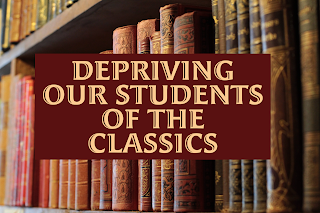This book should be read by all Christian homeschoolers. It definitely shakes up the ingrained traditional methods. Her approach to teaching, a blend of Charlotte Mason and unit study, is interesting because she has developed a system where each child's learning ability can be utilized. I am definitely carefully reading and re-reading the book with the hope of implementing some of her methods with the Charlotte Mason approach we have been using.
However, the part of the book that has made the biggest impact on me has been her writings about the Greek education model versus the Hebrew education model. The comparisons of the Greek method of education to how children are taught in public school here in America, as well as to how many homeschools are run, has been enlightening. Robin also wrote about this method in a blog post on her Heart of Wisdom blog that will give you a taste of how far most of us are from giving our children the kind of education that Jesus had.
Robin Sampson, in this book, talks about devoting a lot of our school day to teaching the Word of God. So much of the homeschool curriculum out there has Bible as a separate subject, some scriptures thrown in here and there in the other subjects, and that is about it. They follow the exact or a similar scope and sequence of the public schools but try to present the information in a Christian way. Now, my belief is that is a lot better than nothing. Just homeschooling takes many of the negative aspects, both from a Christian viewpoint as well as a learning one, out of the equation. However, Mrs. Sampson is correct. If we are a Christian homeschool, we should be delving deep into God's Word. History and Science should be taught from His point of view, not a humanistic or evolutionary point of view with some Scripture thrown in.
I think about the goals I have been praying about and forming in my mind, heart, and soul for my homeschool. I want my children to love Jesus. I want them to be on fire for God, to build their lives on His Word. I want them to have a close relationship with their creator. I want them to have a strong Biblical worldview. This is what I want, but this isn't always how I live.
I was educated in the Greek method of education. I went to public school. Knowledge is prized there far above wisdom. I have caught myself bowing down to fear of stepping out of that traditional, comfortable box. Imagine how crazy that sounds. I go against the norm, ignore or deal with objectors, and decide to homeschool my children. It took courage. It took determination. It took sacrifice. Yet, I find myself teaching those children the only way I know... the way I was taught... the traditional way.
I have stretched myself recently by studying the Charlotte Mason methods of education and right brained learning techniques. Yet, I still believe there should be more. I am seeing a glimpse in Laura as we strive to develop a love of learning, but she is not excited or even interested the way I know she can be. She is just "doing school" still, even if her crazy mommy has mixed things up a little. She likes the changes, but she still holds the same attitude about learning.
She also has the same attitude about Christ. She loves Jesus, but is she living for Him? Does she understand what that means? Is her relationship with Jesus what He would want? I can only do so much here, as the final decisions about her relationship with Christ are hers. However, I can do a lot more than I have been doing. I realized this morning that most of the time we don't even begin our day in prayer. This saddens me immensely. What have I been thinking?!
"More is caught than taught" is the phrase that I read that has stuck with me. Robin Sampson brings up a lot of valid points in The Heart of Wisdom Teaching Approach. She talks about developing an excitement in children, and having the students use the information they learn. As a former scrapbooker, using scrapbook materials in education peaked my interest. I may not have the time I used to have to put together the scrapbooks, but I did enjoy the process. I can easily see how using this and other creative techniques can help students learn and retain information.
I've only played around with the unit study approach, which is talked about a lot in this book. It's not exactly in the Charlotte Mason philosophy, though I can see how the methods could blend here and there. What I do know is that the education my children receive is important. It is important not just because I want them to be well educated. It is important because I think that education should lead them closer to God, showing them how to live their lives for Him.




No comments:
Post a Comment